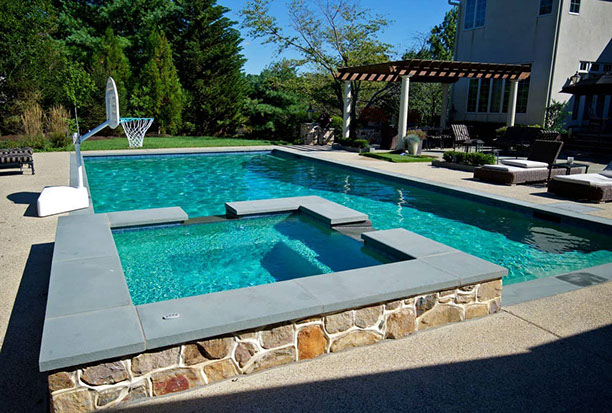
Table of Contents
Introduction
Imagine having your very own backyard oasis right here in Pennsylvania! Adding a pool to your property can be a real game-changer, but it’s also a big decision with many factors to consider. That’s why we’ve created this ultimate guide to help you choose the right pool builder in Pennsylvania.
Do You Need a Permit for a Pool in Pennsylvania?
If you’re planning on building a pool in Pennsylvania, the short answer is yes, you will need a permit. Most cities and townships in PA require a permit to build a pool – whether it’s an above-ground or an in-ground pool. This is primarily for safety, compliance, and to make sure everything is done according to state regulations.
Here’s a quick tip: The cost and requirements for getting a permit can vary based on your municipality. You may need to submit your pool design, show proof of property lines, and even have a safety inspection post-construction. Your pool builder should be knowledgeable about local ordinances and help guide you through the permit process.
Some common questions people have when considering pool permits include:
- What are the pool laws in Pennsylvania? You generally need a permit for in-ground and above-ground pools.
- How close to my house can a pool be? Pool setback distances vary by municipality, usually between 5-10 feet.
- Do I need a fence around my pool in PA? Yes, most areas require a fence for safety compliance.
What is the Most Expensive Part of Installing an Inground Pool?
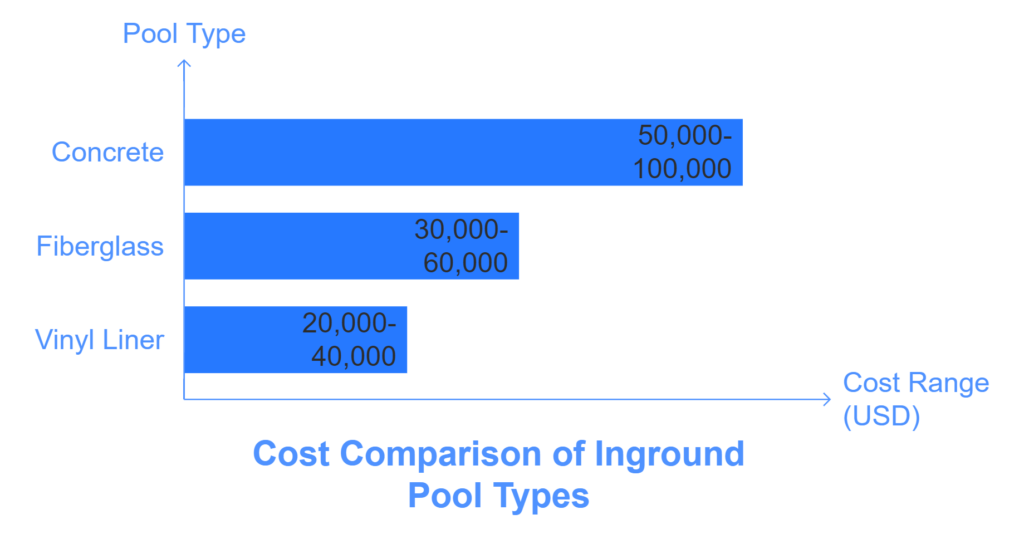
Pools are complex projects with many components. One of the most significant costs in installing an inground pool is excavation and groundwork. Digging a big hole, managing soil conditions, and making sure everything’s level are all labor-intensive and costly.
Another costly element is the pool materials. Concrete, fiberglass, and vinyl are popular choices, but each comes with a different price tag.
Concrete tends to cost between $50,000 and $100,000, making it the most expensive but also the most customizable – ideal for those who want a unique design or features like waterfalls and tanning ledges that add a touch of luxury.
Fiberglass pools generally cost between $30,000 and $60,000, while vinyl liner pools are the most budget-friendly, ranging from $20,000 to $40,000.
The installation process for concrete pools is generally more time-consuming, involving detailed design and curing phases, which add to the cost. On the other hand, fiberglass pools, being pre-molded, come with a shorter installation timeline, reducing labor costs. Vinyl liner pools are a budget-friendly option, but keep in mind the liner may need replacing every few years, which is an ongoing cost.
Some FAQs related to pool installation costs:
- What’s the best bottom for an inground pool? Concrete is durable but more expensive, while vinyl and fiberglass are cost-effective.
- What type of pool is the most expensive to maintain? Concrete pools are the most expensive due to regular resurfacing and maintenance.
- What are the cheapest pool options to install? Vinyl liner pools are generally the cheapest to install initially.
What is the Most Cost-Effective Pool to Install?
Not everyone wants to splurge on a custom concrete oasis, and that’s totally fine. If budget is a big consideration, fiberglass pools are often the most cost-effective option. They’re pre-made and typically quicker to install, which also helps cut down on labor costs.
Vinyl liner pools are another affordable option, and they offer some customization without the hefty price tag of concrete. Plus, they’re great for folks who want to save now and maybe upgrade later.
Here’s a breakdown:
- Fiberglass Pools: Pre-fabricated, fast installation, lower labor costs. These pools are known for their durability and are typically easier to clean and maintain compared to other types, thanks to their smooth, non-porous surfaces.
- Vinyl Liner Pools: Affordable, semi-customizable, easy to maintain. However, liners typically need to be replaced every 7-10 years, which is an additional cost to consider. Vinyl pools offer flexibility in design, but it’s important to weigh the recurring costs of liner replacements.
Wondering what kind of pool is the easiest to maintain? Fiberglass pools often come out on top because their surfaces are less porous, making them less prone to algae growth. Maintenance is significantly easier, which makes them appealing for busy homeowners.
Is It Worth the Money to Put in a Pool?
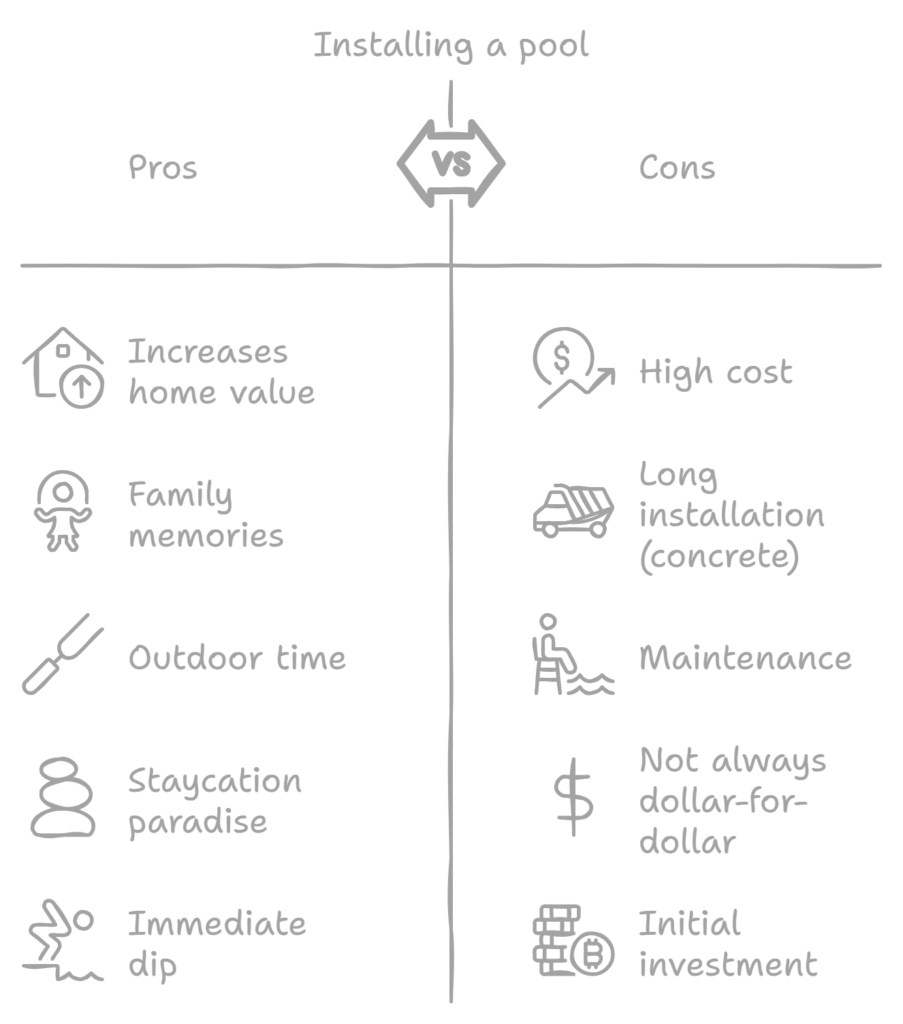
Is putting in a pool worth all the time, money, and effort? The answer largely depends on your lifestyle. If you love entertaining, have kids, or simply love the idea of transforming your backyard into a staycation paradise, then yes, it’s worth it!
A pool can increase your home’s value, but keep in mind it’s not always dollar-for-dollar.
A lot of the “worth” comes from non-monetary value like family memories, having a reason to spend more time outdoors, and just being able to take a dip whenever you want. In Pennsylvania’s hot summers, there’s nothing quite like it.
If you’re concerned about the cost, consider the different types of pools and their respective installation timelines.
Fiberglass pools typically have the shortest installation timeline, while concrete pools take the longest due to design and curing phases. Fiberglass pools are often cited as the best value when factoring in both initial investment and long-term maintenance.
Vinyl liner pools can also be a good entry-level option, allowing you to enjoy a pool without breaking the bank.
Some related questions to consider:
- How do people afford to put in a pool? Many use financing options or home equity loans.
- What’s the most cost-effective way to put in a pool? Fiberglass pools are usually the most affordable considering installation and maintenance.
- Will a pool increase my property value? A pool can increase property value, but often not by the full installation cost.
Tips for Choosing a Pool Builder in Pennsylvania

Choosing the right builder is probably the most critical part of this whole journey. Here are some things to look out for when hiring a pool builder in Pennsylvania:
- Experience & Reviews: Check how long they’ve been in the business and look at their reviews on platforms like Google, Yelp, and Facebook. A pool is a major investment, so you want someone with a solid track record. Look for builders who have demonstrated reliability, customer satisfaction, and a history of delivering high-quality results.
- Portfolio: Ask to see photos of their past projects. If a builder hesitates to show off their previous work, it’s a red flag. An extensive portfolio indicates that the builder has experience with a range of different pool styles and can meet your specific design requirements.
- Permits & Paperwork: A good builder will assist you with the permitting process and help you understand all the paperwork involved. They should be familiar with local regulations and ensure that all steps are followed to avoid any costly legal issues down the road.
- Communication: Building a pool takes time, and you’ll want someone who keeps you updated on the progress, explains any delays, and answers your questions promptly. Clear and regular communication is essential for a smooth building process.
- Customization Options: Some builders offer more customization than others. Make sure your builder is flexible in meeting your design needs, whether it’s adding a waterfall feature, spa jets, or a specific shape that fits your backyard’s unique layout.
- Warranty and Support: Quality builders will provide a solid warranty that covers both the structure and pool equipment. Aftercare and support post-installation are important factors to consider; make sure they provide ongoing maintenance advice or services.
Pro Tip: Get at least three quotes before deciding. Prices can vary significantly, with some estimates ranging from $20,000 to $50,000 or more depending on materials and features like decking options or heating systems. Comparing options will give you a better understanding of what’s reasonable. Remember, the lowest price doesn’t always mean the best value—look for a balance between cost, experience, and quality.
Conclusion
There you have it, folks – everything you need to know about finding the right pool builder in Pennsylvania, navigating permits, and deciding if a pool is the right move for you. Remember, building a pool is an exciting adventure, but it comes with its share of complexities. The good news is, with the right builder and a bit of planning, you’ll be diving into your dream pool in no time.
If you have any questions or want recommendations for top pool builders in your area, feel free to drop me a comment or send me a message. I’m here to help make your pool dreams a reality!

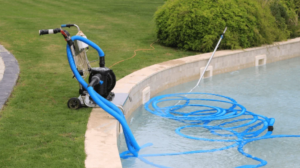
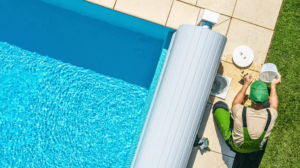

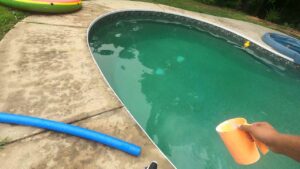
2 Responses